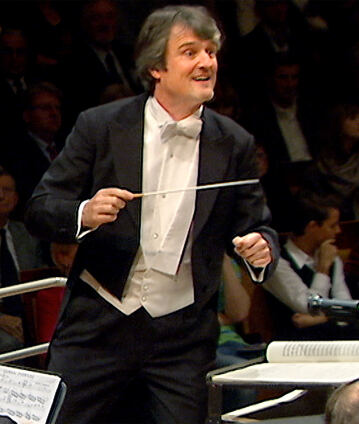An “American Evening” with Ingo Metzmacher and Pierre-Laurent Aimard

In this concert, Ingo Metzmacher presents the many facets of the music of the United States – such as the big band sound in Gershwin’s Cuban Overtureand the modernity of George Antheil’s Jazz Symphony. The main works of the concert are Charles Ives’s enigmatic Fourth Symphony and the Symphonic Dances from Bernstein’s West Side Story – the perfect example of the American fusion of musical innovation and explosive vitality.
Ever since the middle of last century, the United States has had the reputation as the country of unlimited possibilities, also in terms of music. Whether jazz, rock, pop or classical music, it is impossible to imagine the musical world map without America – but this was not always the case. It took a long time before the former New World produced its own musical traditions with international appeal.
One of the pioneers of American music was Charles Ives, born in 1874. However, his music did not set trends despite what even today is seen as its striking modernity – it is too complex, and even the compositional and aesthetic bases of his music are sometimes contradictory. His Fourth Symphony, composed between 1909 and 1916 and only given its premiere more than a decade after Ives’s death, is one of the most enigmatic works by this long-underrated composer.
George Antheil also made a significant contribution to an original American musical style. Initially making a name for himself as a controversial pianist who enjoyed provoking his audiences, he later focused on composing. His interest in all things technical and his fondness for ragtime and jazz are also reflected in his works, including the orchestral piece in this concert, A Jazz Symphony.
For many, George Gershwin is regarded as the American musician par excellence. As Ives already did before him, he worked diverse influences into his music. In his 1932 Cuban Overture, Gershwin took his inspiration from the rousing rhythms of the Caribbean. Whether this gorgeous piece is popular or serious music is no longer debated. As Leonard Bernstein said, who is represented in this Berliner Philharmoniker concert by the Symphonic Dances from his ever-popular West Side Story: There is only good or bad music.
© 2012 Berlin Phil Media GmbH
Related interviews
Artists
Our recommendations
- Pierre Boulez and Pierre-Laurent Aimard with works by Ravel, Bartók and Boulez
- Schoenberg’s Piano Concerto with Pierre-Laurent Aimard and Jiří Bělohlávek
- Simon Rattle conducts Messiaen’s “Turangalîla-Symphonie”
- François-Xavier Roth and Pierre-Laurent Aimard
- Jonathan Nott and Pierre-Laurent Aimard
- The National Youth Orchestra of Germany and Ingo Metzmacher with the “Alpine Symphony”